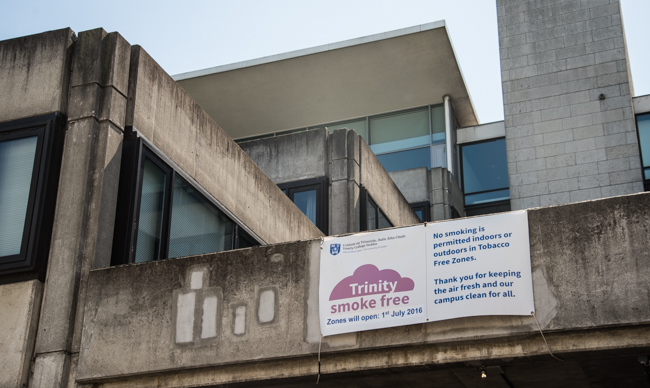Trinity has called its smoking-free zones a “success”, 18 months on from when the controversial policy was introduced.
The introduction of no-smoking zones in Trinity has been heralded as a success by members of the Tobacco Free Trinity Committee. The committee’s latest report, seen by The University Times, cites an average 81 per cent decrease in smoking in the areas now categorised as smoke-free zones.
The report, which measures the rates of smoking between July 2016 and April 2017, found that Fellows Square – the space in front of the Arts Block – was the most popular place for smokers. After over 313 checks, 1,030 people were found to be smoking there. This compares to 84 smokers in the vicinity of the Sports Centre and Lloyd Building after the same number of checks.
In both instances, the report found significant reductions in smoking. The ban on smoking in Fellows Square, the report states, saw a 74 per cent reduction, while the ban had a 92 per cent reduction outside the Sports Centre.
Across all the areas, people were also more likely to refuse to leave as the year continued. There was no “complete compliance” – leaving a zone when asked by a smoke-free ambassador – in any month last term.
Speaking to The University Times, David McGrath, the Head of College Health Services and the Tobacco Free Trinity Committee, explained that there has been “a dramatic decrease in the number of people smoking in the zones”.
McGrath said that they have “measured smoking in the zones sequentially in the past 15 months”. The most popular months for smoking were December and April. During these months, there was an average of 1.27 and 1.25 smokers per check respectively. The lowest smoking rate came in October, when there were 84 per cent less people smoking compared to the College Health Centre’s data from the year before.
McGrath and his team are going to return to Board in December with a proposal to expand the number of smoke-free zones. “We will make proposals based on the information we’ve gathered over the past year”, he explained.
Health Promotion Officer Martina Mullin said that the initiative has been a success. She admitted, however, that while the numbers are reassuring, they are not perfect. The Arts Block benches, for example, still remain a popular spot for student smokers. Speaking to The University Times, Mullin said: “We believe smoking shouldn’t be facilitated on this campus because it’s so detrimental to health.”
Mullin said the project would have failed were it not for the student ambassadors. These ambassadors are paid to examine the three non-smoking zones and ask anyone smoking in them to put out their cigarette or move to another area. Five student ambassadors, paid €8.65 an hour, were hired to maintain the areas. In the report, some ambassadors noted that people had flatly refused to stop smoking.
In total, six per cent of people refused to comply when asked to leave a smoke-free zone.
McGrath said that while Trinity College Dublin Students’ Union (TCDSU) has not been involved in the project, he believes the support of TCDSU and the Graduates Students’ Union (GSU) will be imperative to the continued success of the initiative.
Speaking to The University Times, TCDSU Welfare Officer Damien McClean discussed the reluctance of the union to support the initiative. “When they say it’s been a success, they mean they’ve implemented a policy and there has been a reduction in smoking”, he said.
He asserted that while TCDSU supports the initiative to target the most affected areas, it cannot support a totally smoke-free campus. Following a referendum in 2014, 53 per cent of of voters decided against supporting a smoke-free campus.
Spearheaded by the Tobacco Free Trinity Committee, the initiative to implement smoke-free areas on campus has saw three areas designated as smoke-free zones since July. So far the College Health Centre, the Sports Centre and the entrance to the Arts Block have been deemed as smoke-free zones on campus.
The Tobacco Free Trinity Committee has been attempting to secure smoke-free areas on campus since 2013 when the issue was first raised. TCDSU and the College have often been at odds over smoke-free zones.
The budget for the project is estimated to be around €19,000, which will cover the cost of the student ambassadors and the construction of small smoking shelters in various areas of campus. The initiative is expected to be reviewed by the College Board in December using information gathered in the report.
Trinity is not the first university to adopt policies to reduce the level of smoking on its concept. In 2016, National University of Ireland Galway (NUIG) introduced two smoke-free zones on campus.
With 1,192 checks made, on average there was one smoker per check. This totalled 1,291 smokers across all the zones in the 10-month period.







